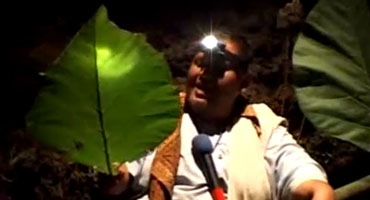
 Saya setuju
Saya setuju
.
Wayang Tanah (2010)
Dalang: Slamet Gundono
Cara penulisan kutipan: Slamet Gundono ([2010] 2016), Wayang Tanah [Wayang of the Soil], translation and notes by Miguel Escobar Varela, Yosephin Novi Marginingrum and Thomas Sembodo. Singapore: Contemporary Wayang Archive. Retrieved from http://cwa-web.org/en/WayangTanah.
Ringkasan (Bahasa Inggris)
Rahwana wants to marry his newborn daughter, Sinta. However, his servant gets Rahwana drunk and sends Sinta into hiding. Rahwana longs for Sinta through poems and songs.
Sumber lakon: Ramayana, Keadaan Terkini
Iringan: Gamelan Kontemporer, Gaya Tersendiri
Artistik: Panggung Garapan
Pemain: Dalang Tunggal, Penari
Jenis wayang: Wayang Kreasi Baru
Bahasa: Bahasa Jawa
Catatan Teknik (Bahasa Inggris)
Catatan: An alternative title for the performance is Shinta, Jahitan Tanah.
Diproduksi oleh: Krisnyar
Direkam di: Padepokan Lemah Putih, Mojosongo, Solo
Pemeran dan kru
Sinden: Ida Lala
Composer: Dedek Wahyudi
Crew: Henry W., Novandika, Redy
Sound: Harjo
Lighting: Radit
Melihat metadata untuk file ini.
Translation and notes by Miguel Escobar Varela (MEV), Yosephin Novi Marginingrum (YNM) and Thomas Sembodo (TS).
1. Jĕmèk [mud that is difficult to cross] YNM.2. Nyĕmĕk [soft mud that is easy to cross] YNM.
3. In a wayang show, The sindhèn [female singers] are usually very well dressed and they sit facing the audience for the duration of the show MEV.
4. Bancèt is a kind of small frog TS.
5. The dalang commonly asks for protection or inspiration from God at the beginning of the show MEV.
6. This is spoken in the Banyumas dialect of Javanese YNM.
7. Word play. In the Banyumas dialect tĕka [to arrive] is often pronounced tĕkak, which provides the opportunity for a joke. In Yogyakarta and Surakarta tĕkak means to strangle YNM.
8. These are the names of regencies in West Java MEV.
9. Kyai [religious teacher], santri [Islamic boarding school] MEV.
10. Nok/dhénok is an honorific used for young daughters YNM.
11. Widyawati/Widawati is the daughter of Batara Wisnu. She is also known as Dewi Sri. In the Ramayana, she reincarnated as Dewi Sita/Sinta, the daughter of King Mantili/Mitila YNM.
12. Ciu is an illicit, homebrew alcohol popular in Java MEV.
13. Prahasta is the son of Prabu Sumali, former King of Alengka. He is the brother of Dewi Sukesi (Rahwana's mother). After Rahwana was crowned as King of Alengka, Prahasta was named commander of the armed forces YNM.
14. Togrog is another way to spell Togog YNM.
15. Puspa tajěm [sharp flowers], is a term that designates meaningful or prophetic dreams YNM.
16. Matamu [your eyes] is a joking expression of anger MEV.
17. Word play on aridity and fertility. Rasa kangĕn subur marang ingsun [a feeling of loss that is fertile towards me] is set in opposition to the aridity of the land MEV.
18. Dewi Sukesi is the daughter of Prabu Sumali, former king of Alengka. In a contest, Sukesi's hand in marriage was offered to anyone who could decipher the meaning of the Sastra harjéndra yuningrat. Begawan Wisrawa won the contest on behalf of his son Wisrawana / Prabu Danaraja. Dewi Sukesi was supposed to be brought to Lokapala and marry Prabu Danaraja. However, Dewi Sukesi refused this, as she would only marry the person who had won the contest. Thus, she married Begawan Wisrawa, with whom she had four children: Rahwana / Dasamuka, Kumbakarna, Dewi Sarpakenaka, and Wibisana YNM.
The honorifics in the original languages were retained in the subtitles. In Javanese and Indonesian, speakers address their interlocutors with over 40 different honorifics which denote differences in their relative status and level of intimacy.
ID = Indonesian
JW = Javanese
Adik. ID. Younger brother/sister. It is used for addressing younger people, not necessarily one's relatives.
Adinda. ID. Younger sister. More intimate than adik.
Babé. ID/Betawi. Familiar form of father, commonly used in Jakarta.
Bé. ID/Betawi. Short form of Babé, father. Jakartan slang.
Bang. ID. Older brother, short form of abang. If used with non-relatives, it is has the connotation of a slang, and is somewhat equivalent to “man” in English.
Bĕndara. JW. Master.
Bibi. JW/ID. Aunt. A way of addressing/referring to older women.
Bos. ID/JW. An adaptation of the English "boss". Used either to refer to one's superior or to a friend in a joking context, for example, when a person orders others around without realizing he/she is doing so.
Bu. ID/JW. Short form of ibu, mother.
Bung. ID. Similar to bang, but slightly less formal. It might mean "comrade". The political leaders of the independence war are often referred to with this term, for example Sukarno is often referred to as
Bung Karno.
Dara. JW. Short form of bĕndara, master.
Dèn. JW. Sir, master, used to address royalty. Short form of radèn.
Dhé. JW. Short form of pakdhé, uncle.
Dhik. JW. Short form of adhik. Younger brother/sister. It is used for addressing younger people, not necessarily one's relatives.
Éyang. JW. Grandfather.
Dimas. JW. Younger brother.
Gusti. JW. Lord. Used to address superiors and Gods.
Ibu. JW/ID. Mother. Used generically to address women who are older than the speaker.
Kakang. JW. Older brother.
Kakang mbok. JW. Older sister.
Kanda. ID. Older brother. Formal.
Kang. JW. Older brother. Informal.
Kangmas. JW. Older brother.
Kaki. JW. Uncle
Kang. JW. Older brother, used generically for men older than the speaker. It is a shortened version of kangmas).
Kakak. JW/ID. Older brother/sister, used generically for people who are older than the speaker.
Lé. JW. Son, short version of tholé.
Lik. JW. Often used between friends as a slang term of address. Uncle, "little father." Short form of {paklik}.
Ma. JW. Same as pak, short form of rama.
Mbak. JW/ID. Older sister. Used generically for women who are slightly older than the speaker.
Mamang. ID. Uncle.
Mang. ID. Uncle, short form of mamang.
Mas. ID. Older brother, used generically for men who are older than the speaker. Although it is also a shortened version of the Javanese kangmas people prefer to use mas in Indonesian and kang in Javanese.
Mas bro. ID. Slang used among male friends. In a way, it is a reduplication.
Mbah. JW/ID Grandfather, grandmother. It is used generically to address people who are much older than the speaker. Short form of simbah.
Mbok. JW. Mother, short form of simbok. Used generically for women who are older than the speaker.
Mbokdhé. JW. Aunt. Literally, "big mother".
Mbul. JW. Informal term of address between close male friends.
Ndara. JW. Master.
Nduk. JW. Daughter, short form of gĕndhuk.
Nggèr. JW. Son, short form of anggèr Used generically for people who are younger than the speaker, with whom the speaker is on intimate terms.
Nimas. JW. Younger sister.
Nok. JW. West Javanese term for daughter, short form of dhénok.
Nona. ID. Miss, unmarried woman.
Paduka. ID. Your Excellency.
Pak. JW/ID. Father, used generically for men who are older than the speaker.
Pakdhé. JW. Uncle. Used to refer to a man who is older than one's father.
Paman. ID. Uncle. Used to refer to a man who is older than one's father.
Pangéran. JW/ID. Prince.
Prabu. JW. King.
Radén. JW. Master, used for royalty.
Rama. JW. Father. It can also be used to designate catholic priests when one is speaking in Indonesian.
Simbah. JW/ID Grandfather, grandmother. It is used generically to address people who are much older than the speaker.
Sinuwun. JW. Very formal way to address a man, reserved for sultans, kings and Gods.
Siwa. JW. Term for addressing older people.
Siwak. JW. Same as Siwa. Term for addressing older people.
Tholé. JW. Son
Tuan. ID. In colonial contexts, this is the way foreigners are addressed but it can also mean sir.
Wa Nĕrpati. JW. Uncle king, equivalent to the Indonesian paman raja.
Wa. JW. For addressing older people, short form of siwa.
Yayi. JW. Younger brother/sister.
Yunda. JW. Older sister.
See the Translation conventions.
Share:
dalam terjemahan atau informasi video.
